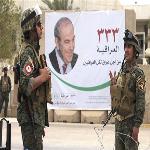17 March 2010

Photo: AP
Iraqi policemen stand guard in front of an election campaign poster for former Iraqi Prime Minister Ayad Allawi at a checkpoint in Baghdad, 17 Mar 2010
A new frontrunner has emerged in the ongoing vote tally from Iraq's March 7 parliamentary elections. But as the cross-sectarian coalition of former Prime Minister Iyad Allawi pulls slightly ahead of Prime Minister Nouri al-Maliki's bloc, complaints about vote-counting irregularities increase.
Mr. Allawi's Iraqiya took the lead for the first time in the popular vote. But Mr. Maliki's State of Law coalition continues to be ahead in the projected number of seats in the next parliament.
Various groups have alleged fraud and other problems with the vote counting in the past ten days.
Until recently, Prime Minister Maliki had rejected such accusations. Now, he and his allies are the ones calling foul and demanding a recount.
Hussein el-Taaie, a spokesman for the High Electoral Commission, acknowledges there have been complaints, and says they will be investigated.
Twenty percent of the domestic vote remains to be counted, as do the overseas votes and more than a half million ballots cast in early voting.
The results so far reinforce predictions that no group will gain an outright majority.
State of Law and Iraqiya have positioned themselves as secular centrists, ready to put the sectarian divisions of recent years behind them.
Representatives of both parties have begun talking about the inevitable realignments that will be needed to form a government.
Iraqiya spokesman Salim el-Jabouri says his bloc is willing to hold talks with all parties.
But he says no decision will be made without consultations with everyone in the bloc.
Once all the votes are counted, more challenges can be made. Eventually, the results will be certified by election officials, and the new coalition building will begin in earnest.
Kurdish groups and candidates representing anti-American Shi'ite leader Moqtada al-Sadr, who made a strong showing, could play a key role in such negotiations.